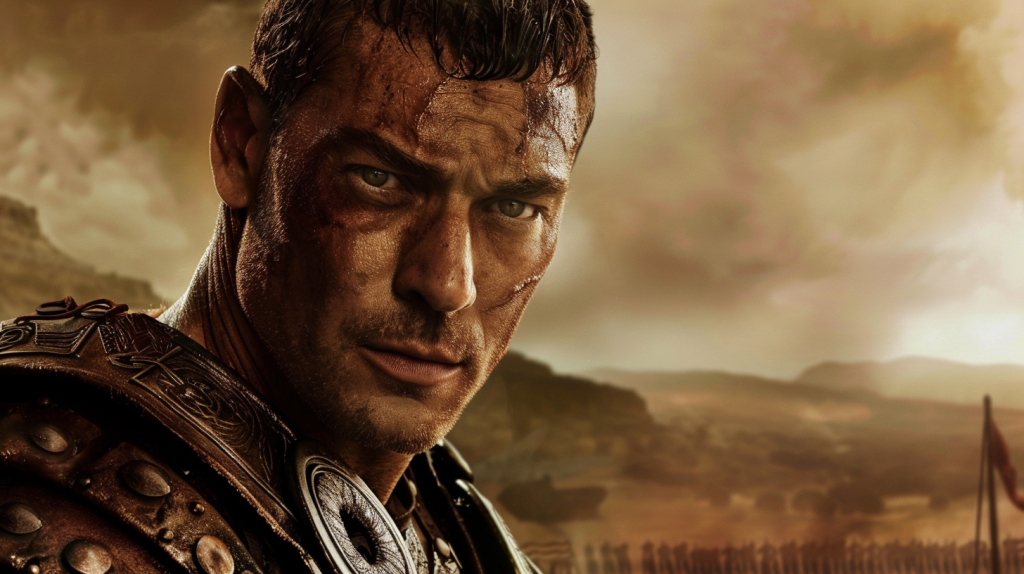Spartacus, a name that echoes through history, was a Thracian gladiator who led a monumental slave rebellion against the Roman Republic. He really did exist. But he wasn’t quite the character Hollywood and literature have made him out to be. He wasn’t crucified or otherwise tortured and made an example of, as depicted in the movies. Nevertheless, his story is one of bravery, strategy, and the undying quest for freedom. This is the remarkable journey of Spartacus, the man who dared to challenge the might of Rome.
It’s also important to remember that he lived several thousand years ago, and much of his story, and of those with whom he lived are lost to time. And, the records that we do have were often written by his enemies, are incomplete, or were written by people who never met him. And some were written many years after his death.

From Thrace to Gladiator School
Spartacus was born in Thrace, a region in Southeast Europe, known for its fierce warriors. During the first century B.C., the Romans frequently clashed with the Thracians. At some point, Spartacus served in the Roman army. He later deserted and either became a bandit or joined an insurgency against Rome. Captured and sold into slavery, he ended up in a gladiator school in Capua, Italy, owned by a man called Vatia.
The Great Escape
In 73 B.C., Spartacus and about 70 other gladiators planned a daring escape from their school. They armed themselves with kitchen knives and other makeshift weapons. This escape was not just about seeking freedom; it was the beginning of a significant rebellion. They fled to Mount Vesuvius, gathering supplies and more followers along the way. Spartacus’s wife, a Thracian prophetess who worshipped the god Dionysus, was by his side. She even foretold his important but tragic future.
First Fight and Early Victories
Spartacus and his followers reached Mount Vesuvius, which was lush and fertile at the time. Here, they prepared for battle. The Roman authorities, not considering them a serious threat, sent a small force under praetor Gaius Claudius Glaber to capture them. Glaber’s strategy was to blockade Spartacus on the mountain. However, Spartacus outsmarted him. Using vines to descend the mountain, he surprised and defeated the Romans, leading to a wave of new recruits joining his cause.
Growing the Rebel Army
Spartacus’s early victories boosted his reputation and drew thousands of slaves to his side. His army swelled, and they moved through the countryside, raiding for supplies and freeing more slaves. Spartacus insisted on sharing the spoils equally among his men, which helped maintain loyalty and attract even free people to his cause. This strategy turned a group of desperate escapees into a formidable force.
Confronting Rome’s Might
By 72 B.C., the threat posed by Spartacus could no longer be ignored. The Roman Senate sent consuls Lucius Gellius Publicola and Gnaeus Cornelius Lentulus Clodianus with large armies to defeat him. Spartacus, however, demonstrated remarkable tactical skill. He managed to escape traps and defeat the Roman forces, allowing his army to march toward the Alps. Here, he faced a critical decision: escape over the Alps to freedom or continue fighting in Italy. For reasons lost to history, Spartacus chose to stay, likely influenced by his men.
The Alpine Mystery
Why didn’t Spartacus cross the Alps? Historians have debated this question for centuries. Some suggest his men wanted to continue their fight, perhaps envisioning a march on Rome itself. Others believe Spartacus received news of Roman advances in Thrace, making him doubt the safety of returning home. Barry Strauss, in his book “The Spartacus War,” posits that the sight of the imposing Alps might have discouraged his troops. Regardless, Spartacus turned back, setting the stage for further conflict in Italy.
Betrayed by Pirates
Spartacus aimed to cross to Sicily, where he hoped to ignite another rebellion. He made a deal with Cilician pirates to transport his forces across the Strait of Messina. However, the pirates betrayed him, taking his gifts and abandoning him. Spartacus then attempted to build his own boats, but bad weather and Roman fortifications thwarted these efforts. This betrayal was a significant blow, leaving Spartacus and his army stranded in Italy.
Enter Crassus
Desperate to end the rebellion, Rome appointed Marcus Licinius Crassus, a wealthy and ruthless leader, to defeat Spartacus. Crassus took command and implemented strict discipline, even executing soldiers for cowardice. He constructed fortifications to trap Spartacus in southern Italy. Spartacus managed to break through using his cavalry, but his forces were increasingly worn down by continuous battles.
The Final Stand
In 71 B.C., Spartacus’s army was divided and weakened. Crassus, along with additional Roman forces, closed in for the final confrontation. Spartacus attempted to negotiate peace, but Crassus refused. In the ensuing battle, Spartacus fought valiantly, reportedly killing several Roman centurions. Despite his bravery, he was eventually surrounded and killed, marking the end of the rebellion.
The Stone Wall
In 2024, archaeologists uncovered the remnants of a stone wall in the Dossone della Melia forest in southwestern Italy. This wall, stretching 1.7 miles (2.7 km), was built by Roman forces to trap Spartacus and his followers during the Third Servile War. The discovery of weapons and other artifacts at the site provides a tangible connection to the epic struggle and the immense effort Rome invested in quelling the rebellion.
The Mystery of Spartacus’s Burial
Spartacus’s body was never identified after the battle. He likely died without any distinguishing marks or armor, making his remains indistinguishable from those of his men. Buried in a mass grave, Spartacus’s final resting place remains a mystery.
The Enduring Legend
Although Spartacus’s rebellion was crushed, his story lives on as a symbol of resistance against oppression. His name is more widely recognized today than those of the Roman leaders who fought him. Spartacus’s tale has inspired countless stories, movies, and TV shows, reminding us of the power of the human spirit and the enduring quest for freedom.
